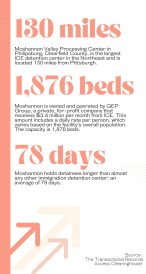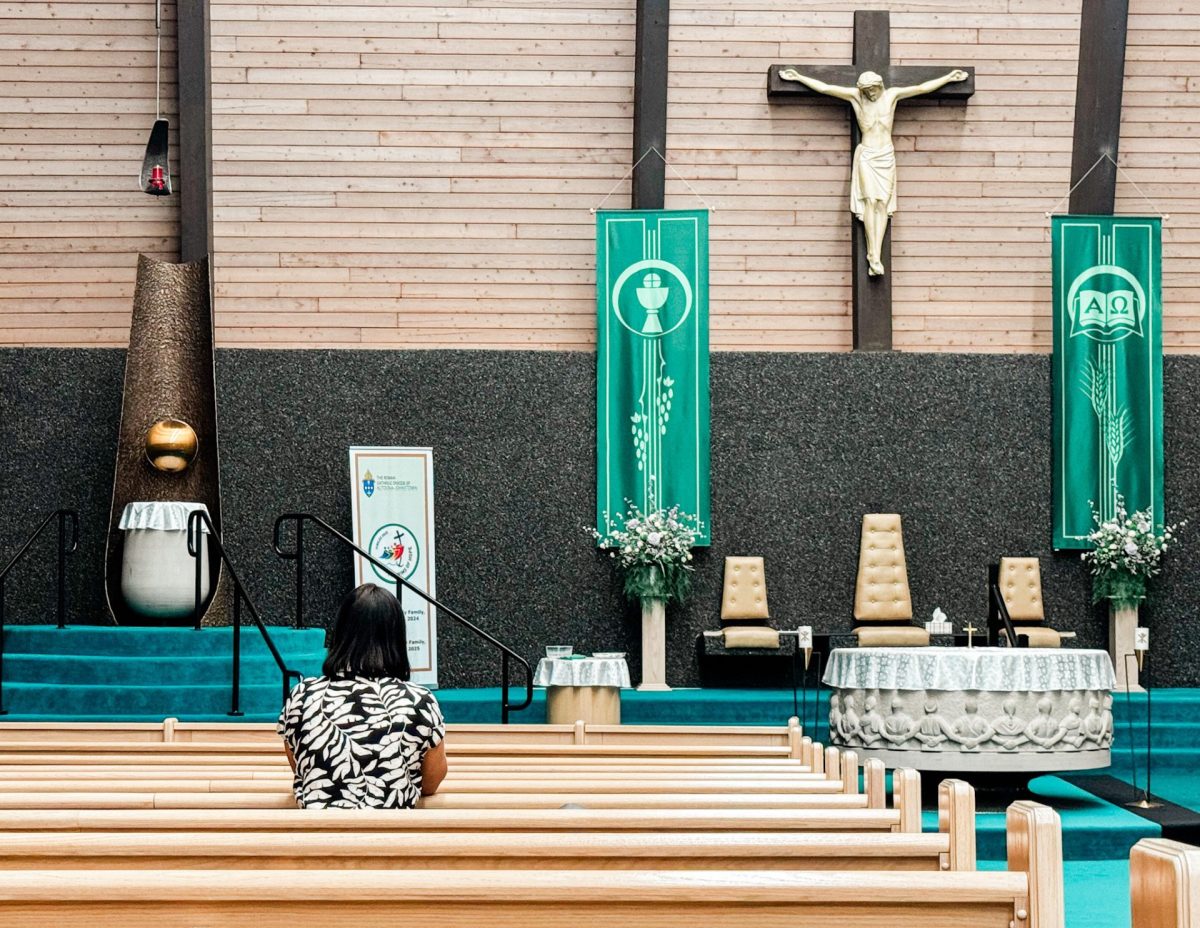‘The weight of the wait’
Detained Washington County church member awaits immigration hearing
PHILIPSBURG – Liseth Carvajal knelt in a pew at Sts. Peter and Paul Catholic Church in Philipsburg, Clearfield County, on Wednesday morning, fingers laced in prayer.
Three miles away, her husband, Jesus Teran, sat in a visiting room at Moshannon Valley Processing Center, the largest immigration detention center in the Northeast, separated by a plexiglass panel and netting from the Rev. Jay Donahue, senior parochial vicar at St. Oscar Romero Parish in Washington County, where Carvajal and Teran are members, and Erenia Karamcheti, the parish’s social worker.
Teran, 35, a civil engineer from Venezuela who works for a local carpenters union, was detained on July 8 while reporting to the Immigration and Customs Enforcement field office in Pittsburgh for a scheduled check-in. He was sent briefly to Northern Regional Jail in Moundsville, W.Va., before he was moved to Moshannon.
A detention hearing, slated for Aug. 14, will determine if the father of two can reunite with his family in their Imperial, Allegheny County, home, or if he will be deported.
“We’re hoping for a miracle and that Jesus can come home,” Donahue had said earlier in the day at a diner where he, Carvajal and Karamcheti ate breakfast before heading to see Teran for the first time in a month. “There is no humanity or dignity at all in the conditions the men and women are being forced to live in. These are human beings, and they’re being treated as if they’re less than that, wearing color-coded prison uniforms and sleeping in a room with 79 other people, with no privacy.
“We want to advocate for Jesus and the human beings in there. We’re dealing with a broken immigration system, and Jesus is being treated as if he is a dangerous felon, when in fact he was following the rules and doing everything he was supposed to do.”
A facility under fire
Moshannon, owned by the Florida-based GEO Group, is a private, for-profit facility that has faced numerous allegations of civil and human rights violations.
Multiple complaints have been filed against Moshannon, including a federal complaint last year by the American Civil Liberties Union of Pennsylvania and other civil rights advocates.
A report last fall, “In the Shadow of the Valley,” by law students at the Sheller Center for Social Justice at Temple University Beasley School of Law and the immigrant rights group Juntos, describes “inhumane, punitive and dangerous conditions” at Moshannon and calls for its closure.
Dr. Jennifer Lee, associate professor of law at Temple University who supervised the law school’s report alleging abuses at Moshannon, said detainees are not there because of a crime, but that many are asylum-seekers being detained while their immigration cases are being processed.
Teran, who came to the United States in 2021 seeking asylum to flee violence in Venezuela, has no criminal record.
According to data from TRAC (Transactional Records Access Clearinghouse), a data gathering organization founded at Syracuse University, as of July 27, 56,945 people were being held in ICE detention, and of those, 71.7% have no criminal conviction.
But the idea of who is considered a “criminal” has expanded to include most undocumented people, said Linda Hamilton, an immigration attorney from Peters Township and adjunct professor at University of Pittsburgh School of Law.
“What we are witnessing is a deliberate erosion of human rights and due process. People who have lived in the U.S. for decades while working, paying taxes, raising children, checking in with ICE, doing everything right, are now being rounded up and thrown into detention as if they’re a threat to public safety. This is not about protecting the public. This is about mass detention and fear-based policy.”
The Temple University report documents a range of alleged abuses, including insufficient medical and mental health care, the use of solitary confinement (TRAC data shows an average of 147 people ended up in solitary confinement per month at Moshannon), inadequate access to translation services, due process violations, physical and psychological abuse, and little opportunity for religious practices.
There are no religious services for detainees like Teran, who attended Mass on Sundays at Our Lady of the Miraculous Medal Church in Meadow Lands, where Donahue leads a Spanish worship service.
“I think it’s a huge human rights problem that they don’t have access to practice their religion in a processing center,” said Donahue, noting the facility does have a chaplain. “It’s outrageous that people like Jesus, who have no felony record at all, can’t practice their religion. He can’t receive Communion. I’ve been to all kinds of facilities before, and I was shocked. There are Muslims and Christians in there, and there’s really extremely limited access to any religious services or religious materials.”
Under heavy guard

GEO Group operates more than a dozen federal immigration detention centers across the country, and Moshannon is the ninth largest for-profit detention center in the U.S.
Moshannon served as a federal prison from 2006 until it closed in March 2021. It reopened in September of that year as an immigration detention facility after Clearfield County Board of Commissioners entered into a five-year contract with GEO Group and ICE.
According to the Temple University report and the Clearfield County commissioners’ annual budgets, ICE pays GEO about $3.4 million per month, which includes a daily rate per person that depends on the overall population of the facility. GEO pays the county $200,000 annually to operate.
An estimated 1,340 detainees are currently at Moshannon.
At facilities like Moshannon, additional fees that are paid per detained person can have an impact on the revenue generated.
Temple University’s Lee said “profit is certainly what drives some of this.”
“Private industry had a large hand in making and maintaining this detention system. Their profits matter,” she said.
Detainees are required to pay for phone calls (as much as 21 cents per minute for video calls, according to the Temple report) and additional food and snacks from accounts they can set up, and into which family and friends can deposit money.
“For people in immigration detention without bank accounts, credit cards, or other financial means, keeping in touch with family members becomes almost impossible,” the report concluded.
Pittsburgh Women for Democracy, whose members participated in a protest at Moshannon last month, contends that separating immigrants – including many who have lived in the U.S. for years and are primary breadwinners and parents of U.S.-born children – from their families, communities and jobs doesn’t make communities any safer.
The detention center sits atop a hill and is surrounded by an electric fence topped with barbed wire. Signs indicate drones are in use and armed guards greet vehicles approaching the facility.
“It is surreal. It’s intimidating,” said Megan Guidi, a member of Pittsburgh Women for Democracy. “It’s completely stark and desolate. We were all kind of shaken by it; everyone was completely silent. It was just unbelievable.”
In March, ICE conducted a compliance investigation, and Moshannon received a “Superior” rating, with the department finding zero deficiencies after reviewing 28 standards. But immigrant advocates and researchers are skeptical about the findings of the investigation, and the Temple report said government inspections contradict the reports of people detained there.
Civil rights groups have advocated for more humane alternatives to detention centers. Organizations such as the National Immigrant Justice Center are calling for implementing community-based services and alternatives to detention that cost a fraction of the billions spent on immigration incarceration and provide a pathway to citizenship.
“The ostensible reason for detention is, one to protect people, and we can dispel that because the vast majority of these folks are not dangerous,” said Lee. “And the other justification is risk of flight, a concern that people won’t show up for immigration hearings. But research shows that there are very high rates of appearances at hearings.
“There are more humane and cheaper alternatives that work for the system and don’t require pulling them away from their families, locking them up and having to feed and house them. But our system is designed to punish. We have to remember their humanity, and that’s not happening.”
Efforts for immigration reform are stalled, with deep divisions between political parties on how to address immigration preventing any meaningful changes.
A House bill from the 2023-24 session aimed at banning private correctional institutions and immigration detention centers did not pass.
More recently, U.S. Rep. Maria Salazar (R-Florida) introduced the Dignity Act, a bipartisan bill that aims for comprehensive immigration reform, such as granting legal status to some undocumented immigrants and providing protections for Dreamers.
Immigration advocates encourage people to contact their elected officials to demand reform.
‘They feel hopeless’
But while the battle for reform of the immigration detention system continues, detainees like Teran and their families suffer from the emotional toll of possible deportation and separation from their loved ones.
“The wait is the weight,” said Donahue. “The hardest thing is that there’s no end. There are people who are thinking, ‘In a week I’ll have my hearing,’ and then it doesn’t happen, and then they wonder, ‘When am I going to get out?'”
The day before Teran’s visitors arrived at Moshannon, a 32-year-old citizen of China died after he was found hanging by his neck in the shower room of his detention pod. The man had been in ICE custody for five days and was awaiting an immigration hearing. A handwritten note was found and his death was ruled a suicide.
One man who was in Teran’s pod decided to give up his fight to remain in the U.S. after the death and self-deported, Donahue said.
“A lot of people are losing hope here because their humanity is being stripped away. There’s no real due process – that’s being violated. They don’t have people to visit them. They can’t touch a person. They feel hopeless,” he said.
According to the Temple report, Moshannon’s rural location – where there is limited public transportation – and challenges scheduling visits limit immigrant families’ ability to make the journey.
Karamcheti estimates she called the facility at least 100 times to schedule a visit, to no avail. Then, last week, she made the three-hour drive to Moshannon and insisted in person on scheduling a visitation date.
Donahue and Karamcheti spent about two hours with Teran, and then Carvajal visited her husband for about two hours. She said she thought Teran – who was wearing a blue shirt assigned to detainees who are the lowest level of security threat and new eyeglasses that Karamcheti had dropped off on the day she scheduled the visit – had lost weight, but otherwise looked healthy.
Donahue and Teran prayed together, and the priest encouraged Teran to remain hopeful.
When Teran entered Moshannon, he was carrying a prayer card bearing the image of St. Charbel, a 19th century Lebanese monk renowned for his miracles and a symbol of hope and healing, that Donahue had given him days before he was arrested by ICE. The card was taken from Teran and is in his detainee file.
Donahue has prayed daily to St. Charbel for intercession, and he did so at 4 a.m. Wednesday, before he drove to Philipsburg.
When he arrived at Moshannon, with a St. Charbel card in his pocket, Donahue received good news: After three bond appeal denials, Teran finally was granted a bond hearing date before a New Jersey judge.
“Now, we see what happens, and we pray for one more miracle on Aug. 14,” said Donahue, who felt relief after seeing Teran. “It was good to see him. I couldn’t touch him. I couldn’t give him a hug. But that guy’s my man, and I was happy to see him.”
The church community has rallied around Carvajal and the couple’s children, Kamila, 14, and Lukas, 5. The St. Oscar Romero Knights of Columbus Council 3291 has launched a GoFundMe fundraiser https://www.gofundme.com/f/please-help-parish-families-in-their-time-of-need to help Carvajal, a stay-at-home mother, and other families who have lost their financial means.
The congregation created a prayer campaign on the Hallow app, and the family has received a strong show of support from staff and students at Our Lady of the Sacred Heart High School in Coraopolis, where Kamila is a freshman.
And parishioners are tending to the community garden that Teran helped to build at St. Oscar Romero’s St. Patrick Church in Canonsburg this spring as a way to bring together members of English- and Spanish-speaking members in the area.
Teran was described by Chris McAneny, the director of housing for the nonprofit Wellness Collective, which collaborated on the garden, as “the neighbor that everyone would want.”
Teran had been appearing at scheduled ICE appointments for more than four years, and following ICE protocols before he was arrested at the check-in.
Said Pitt’s Hamilton, “There’s no longer a distinction between someone with a clean record and someone with a serious conviction. It’s all being treated the same, as if being undocumented alone justifies indefinite incarceration. That’s not law enforcement; it’s cruelty disguised as policy.”
Donahue said Teran wanted to share a message.
“He asked me to please let people know that we are human beings. We’re hard-working men trying to help our families,” said Donahue. “He said, ‘I miss my family. We all just want to be home with our families.'”



